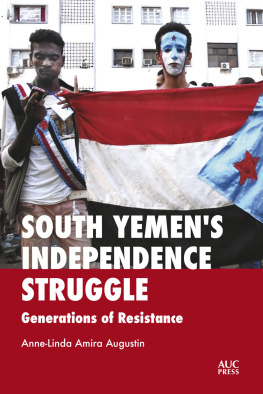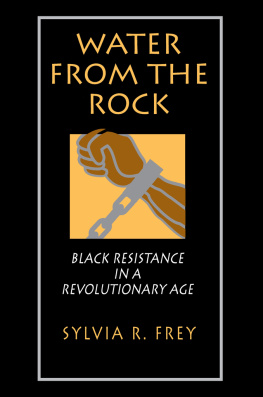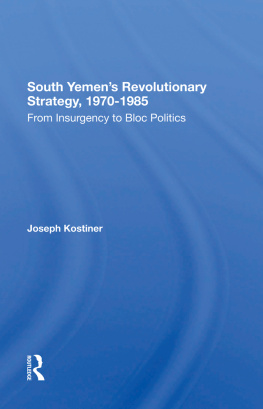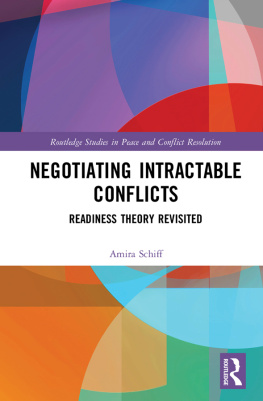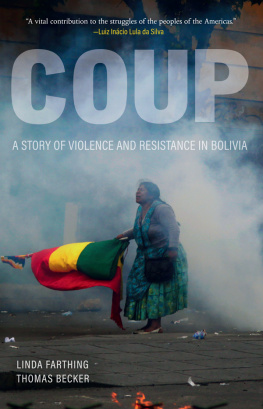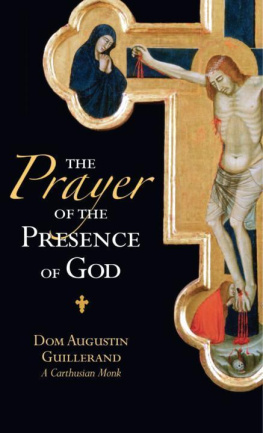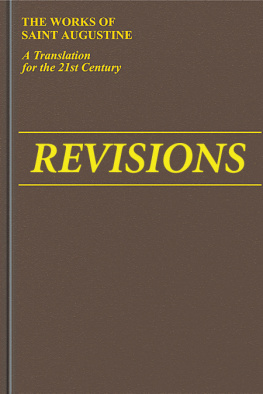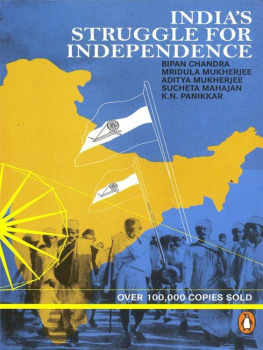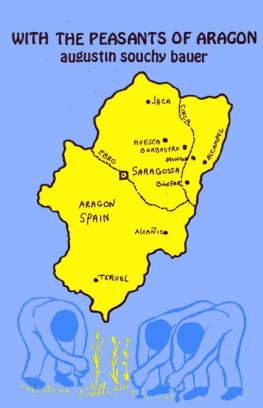Anne-Linda Amira Augustin - South Yemens Independence Struggle: Generations of Resistance
Here you can read online Anne-Linda Amira Augustin - South Yemens Independence Struggle: Generations of Resistance full text of the book (entire story) in english for free. Download pdf and epub, get meaning, cover and reviews about this ebook. year: 2021, publisher: American University in Cairo Press, genre: Politics. Description of the work, (preface) as well as reviews are available. Best literature library LitArk.com created for fans of good reading and offers a wide selection of genres:
Romance novel
Science fiction
Adventure
Detective
Science
History
Home and family
Prose
Art
Politics
Computer
Non-fiction
Religion
Business
Children
Humor
Choose a favorite category and find really read worthwhile books. Enjoy immersion in the world of imagination, feel the emotions of the characters or learn something new for yourself, make an fascinating discovery.
- Book:South Yemens Independence Struggle: Generations of Resistance
- Author:
- Publisher:American University in Cairo Press
- Genre:
- Year:2021
- Rating:3 / 5
- Favourites:Add to favourites
- Your mark:
- 60
- 1
- 2
- 3
- 4
- 5
South Yemens Independence Struggle: Generations of Resistance: summary, description and annotation
We offer to read an annotation, description, summary or preface (depends on what the author of the book "South Yemens Independence Struggle: Generations of Resistance" wrote himself). If you haven't found the necessary information about the book — write in the comments, we will try to find it.
South Yemens Independence Struggle: Generations of Resistance — read online for free the complete book (whole text) full work
Below is the text of the book, divided by pages. System saving the place of the last page read, allows you to conveniently read the book "South Yemens Independence Struggle: Generations of Resistance" online for free, without having to search again every time where you left off. Put a bookmark, and you can go to the page where you finished reading at any time.
Font size:
Interval:
Bookmark:
South Yemens Independence Struggle
GENERATIONS OF RESISTANCE
ANNE-LINDA AMIRA AUGUSTIN

This electronic edition published in 2021 by
The American University in Cairo Press
113 Sharia Kasr el Aini, Cairo, Egypt
One Rockefeller Plaza, 10th Floor, New York, NY 10020
www.aucpress.com
Copyright 2021 by Anne-Linda Amira Augustin
All rights reserved. No part of this publication may be reproduced, stored in a retrieval system, or transmitted in any form or by any means, electronic, mechanical, photocopying, recording, or otherwise, without the prior written permission of the publisher.
ISBN 978 1 649 03108 2
eISBN 978 1 649 03109 9
Version 1
To my family
All photographs are by the author.
Abbreviations
| Ashid | Association of the Yemeni Democratic Youth |
| AQAP | al-Qaeda in the Arabian Peninsula |
| FLOSY | Front for the Liberation of Occupied South Yemen |
| GCC | Gulf Cooperation Council |
| GDR | German Democratic Republic |
| GPC | General Peoples Congress |
| IMF | International Monetary Fund |
| Islah Party | Yemeni Congregation for Reform |
| JMP | Joint Meeting Parties |
| MADAR | Center for General Opinion Studies and Sociological Research |
| NDC | National Dialogue Conference |
| NF | National Front |
| NLF | National Liberation Front |
| PDRY | Peoples Democratic Republic of Yemen |
| Rabita | League of the Sons of South Arabia |
| SMA | South Arabia Media Agency |
| STC | Southern Transitional Council |
| UN | United Nations |
| YAR | Yemen Arab Republic |
| YSP | Yemeni Socialist Party |
Over the course of developing this project, conducting research in South Yemen, and writing the PhD thesis on which this book is based, I have received assistance and support from a number of people and institutions. I am grateful to my familyespecially to my mum, Gabriele, and Oma and Opafor their love, support, and endurance during the long period of time it took to write this book. My family helped carry the burden of this project, with all its difficulties and sorrows, particularly during times like my fieldwork in 2015, when Aden was on the verge of war, and afterward, when warfare spread in Aden and the surrounding governorates. In particular, special thanks are owed to Martin and Theodora Amara for their patience and encouragement in times of frustration. I thank my friends for their encouraging words at lunchtime and coffee breaks during the analysis and writing phases.
My deepest appreciation goes to my supervisors, Professor Dr. Anika Oettler, of the Institute of Sociology at the Philipps-University of Marburg (Germany), and Dr. Susanne Dahlgren, Tampere University (Finland), for their commitment and expertise in supervising this project, as well as for their assistance with theoretical, methodological, and empirical questions. My sincere thanks are also owed to all my other teachers and colleagues, both at Philipps-University of Marburg and Leipzig University. I thank Professor Dr. Eckehard Schulz from the Institute of Oriental Studies at Leipzig University for supporting my semester at the University of Aden in 2007, at a time when most students of Middle Eastern Studies were going to Egypt or Syria. Thanks to his contacts at the University of Aden, I was readily accepted at the university and able to study there for more than a semester. I also thank Professor Dr. Jrg Gertel, formerly professor of social geography at the Institute of Oriental Studies in Leipzig, who believed in my work, served as my first supervisor after my masters studies, and gave me the confidence to pursue a doctorate.
At the Philipps-University of Marburg, I was fortunate to find an intellectual community that has been very inspirational. I am grateful to my former colleagues at the Center for Near and Middle Eastern Studies, especially to those in the research network, Re-Configurations: History, Remembrance and Transformation Processes in the Middle East and North Africa. For her friendship and intellectual companionship, I am particularly indebted to Dr. Andrea Fischer-Tahir. I was in constant communication with her about independence movements and debates on peripheralization. I also owe thanks to Dr. Christoph Schwarz, who shares an interest in intergenerational relations and introduced me to research on intergenerational transmission. This project also benefited from terrific research assistants and student assistants from the research network. Without their legwork, especially their preliminary work in transcribing interviews, the project could not have wrapped up so quickly. I also thank Dr. Anna Dobelmann and Dr. Sonja Veelen, with whom I shared thoughts and exchanged comments on preliminary drafts during the PhD colloquium of Professor Dr. Anika Oettler.
I owe my gratitude to the Yemen research community, with whom I shared stories and experiences during conferences and workshops and from whom I benefited immeasurably. Special thanks to Dr. Marieke Brandt, Dr. Marina de Regt, and Dr. Marie-Christine Heinze. I also offer my appreciation to Dr. Abdulsalam al-Rubaidi, with whom I shared long discussions on sociocultural questions related to South Yemen. I am particularly grateful to Dr. Elizabeth Langston Richardson for her thoughtful and critical comments and edits of my book and PhD thesis. She always encouraged me and had a sympathetic ear. I thank Professor Dr. Monique Marks, Dr. Julten Abdelhalim, Dr. Dimitris Soudias, Dr. Mariam Salehi, Dr. Alena Strohmaier, Dr. Steffen Wippel, Hanna Al-Taher, Samira Selle, and Abdulfattah Esmail Qasem for their help and suggestions on previous works that contributed to this book. Heiner Walter bestowed books on me from the time of the Peoples Democratic Republic of Yemen that are not available for sale. Dr. Cornelius Berthold and Andreas Ngel helped edit the Arabic transliterations of previous versions. I am also grateful to the reviewers and the AUC Press team for helpful suggestions, comments, and editing. I remain indebted to everyone who gave time and energy to this project.
I had help from a large number of people from South Yemen. While I was in Aden, so many people aided me that I cannot possibly mention them all here. My family in Abyan and Aden was an invaluable source of support, helping me make my first contacts with Southern Movement activists and scholars from the University of Aden. Several scholars from the University of Aden generously helped me, among them Professor Dr. Mahmud Shaif Hasan (social work), Professor Dr. Zayn Muhsin al-Yazidi (economics, killed in December 2014), Professor Dr. Asmahan Aqlan al-Alas (history), and Professor Dr. Fadl Abd Allah al-Rabii (sociology), to all of whom I remain eternally grateful. I also thank the Faculty of al-Habilayn (Lahij) for granting me access, and to the teachers of the Faculty of Zinjibar (Abyan), whose efforts were stymied due to the polarization around the southern cause at that time. I thank Yasir al-Yafai for taking the risk of bringing my female relative and me to al-Habilayn. I am grateful to the Center for General Opinion Studies and Sociological Research (MADAR) for giving me access to its roundtable discussions. I also offer my gratitude to Professor Dr. Salih Basura (who passed away in 2018) and his team at the Al-Rasheed Center for Enlightenment, Training and Studies in Aden for granting me access to the library and lectures held at the center. I thank Suad Alawi, director of the Aden Center to Raise Awareness of the Risk of Drugs, for her hospitality in allowing me to join events organized by the center. My thanks as well to the German House (closed due to the war in 2015) and the French Institute in Aden, where I always found open doors. I am also indebted to the General Southern Teachers and Educators Union, school directors, and teachers who allowed me to visit multiple schools in Aden and Abyan. This project also benefited from the amazing support of Fadwa Salim Haydarah Assiri, with whom I transcribed interviews in 2014. We engaged in long and intensive debates about the past.
Next pageFont size:
Interval:
Bookmark:
Similar books «South Yemens Independence Struggle: Generations of Resistance»
Look at similar books to South Yemens Independence Struggle: Generations of Resistance. We have selected literature similar in name and meaning in the hope of providing readers with more options to find new, interesting, not yet read works.
Discussion, reviews of the book South Yemens Independence Struggle: Generations of Resistance and just readers' own opinions. Leave your comments, write what you think about the work, its meaning or the main characters. Specify what exactly you liked and what you didn't like, and why you think so.

